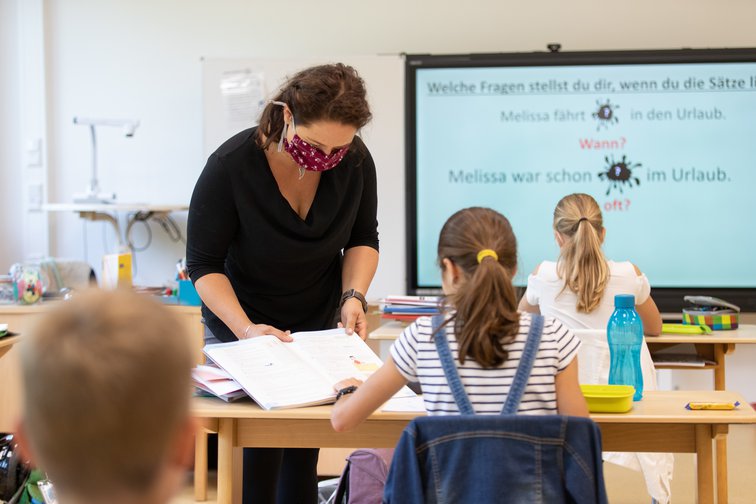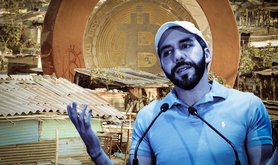
The bookbinder and the exorcist: the future of digitalisation in education (and everything else besides)
In education, as elsewhere, we should not oscillate between anachronistic technophobia and the blind faith which means handing over all our information, about children, their teachers and families, to multinational companies.

“We are guided by an elite that uses digital technology but not digital rationality”.
Alessandro Baricco
Public policies relating to digital tend to oscillate between carefree techno-solutionism and technophobic neo-Luddism. The result of these neurotic lurches in approach to policy, where the educational community is lectured about the dangers of technology while at the same time being thrust into the arms of large digital corporations, is that such corporations now control and monitor the vast majority of educational establishments... and, with that, the behaviour of students, teachers and families.
But in fact things can be different. In this article will explore how. To do so, we will look at a practical example: our plan, drawn up with families, on the Privacy and Democratic Digitalisation of Schools, recently accepted by the Catalan Department of Education.
The invention of the printing press democratised access to knowledge, and led to the Enlightenment, a historical era in which we started to defend that “human knowledge could combat ignorance, superstition and tyranny to build a better world” (according to Wikipedia).
We’ve got a newsletter for everyone
Whatever you’re interested in, there’s a free openDemocracy newsletter for you.
Since that invention, ever greater numbers can read and even write books. Books have been used in teaching for a long time. And not only books that speak of erudite, practical things; fiction, too, plays a role in teaching.
Ever since the invention of the printing press, books have been used to build our societies, yet no one, in this last half a millennium or so, will have ever entertained the idea that in order to read these books, or use them to teach, we would first expect people to learn how to bind them.
It is true that there have always been, and will always be, authorities that want to decide what can be read and what cannot be read, who consider books dangerous, something to be feared rather than understood. Yes, both books and authors have been banned, burned and censored, but it is generally accepted throughout the democratic world now that such practices aren't very suitable.
It is therefore surprising that, in some countries like Spain, the most common format for teaching digital in the classroom is through programmes created and training offered by ICT technicians and the police. As an analogy with books, this is like literature being taught by bookbinders and exorcists (and this is not in any way to detract from either of those professions).
In some cases, digital training also involves experts in ethics, which is not necessarily a bad thing as long as such ethics teachers are also expected to be involved in the teaching of literature, mathematics, economics, science, history, geography, the arts and physical education.
In short, if we want to prove ourselves a society fit for our times, and to take advantage of the digital revolution, we should be no more afraid of digital than we are of any other tool, nor should it be a prerequisite to be technology experts. All we need is to understand it.
While tech exorcists lecture the educational community on the perils of the Internet, multinational firms that are dedicated to the processing of data on people’s behaviour for a whole host of purposes are taking over classrooms.
The bookbinder-exorcist approach to the issue can result in pitfalls and stereotypes, with digital policies oscillating between: carefree techno-solutionism (“We can solve anything by buying into fancy digital gadgets without a second thought as to the impact on private personal data”) and technophobic neo-Luddism (“Vade retro, machines of the devil! Let’s ban social networks and the Internet to protect children! [and then we can treat the general population like children too, all the better to keep tabs on them]”).
Option number one is usually the one chosen by conservative politicians, option two by those on the left, although, credit where it is due, there are some highly creative hybrid forms on both sides.
One result of this type of policies is that, with the approval of the political authorities, at least in Spain, Google (and similar tech companies) has digitalised more than two thirds (2/3!) of schools, among other institutions. So, while tech exorcists lecture the educational community on the perils of the Internet, multinational firms that are dedicated to the processing of data on people’s behaviour for a whole host of purposes are taking over classrooms. They are so big, that we must trust them ontologically, as they were our mum and dad. What proves that they are mum and dad? They give it for free! All the schools scared and digitalized for free. Isn't it marvellous?
Is this the digital democracy we want? The truth is that we should not oscillate between anachronistic technophobia and the blind faith that in handing over all our most intimate and private information, about children, their teachers and families, to multinational companies.
The point is that digitalisation can and should be democratic and respect such human rights as privacy, both for children and young people and the public in general; political will is needed to move on from anachronic stereotypes. All the pieces of the puzzle are already out there to provide a coherent response to the challenge we face in updating the digital world with relatively little effort.
A year ago, a group of parents set out to do something about the problem and contacted us. Together we created the Plan for the Privacy and Democratic Digitalisation of Schools. A year ago, we presented this Plan to the Catalan Department of Education (Education is a devolved matter and we are based in Catalonia) Covid-19 has provided further proof of just how necessary and relevant the project is.
Covid-19 has also shown us that, in general, our institutions are behind the curve in the digital process, and, even worse, behind the curve in the political will to truly understand digital. This explains why digital simply happens, obeying no other criteria than the wishes and profits of private companies, with politicians buying into whichever company they have personal ties to, or the first salesperson to dangle some shiny new toy in front of them.
Another example thrown up by Covid-19: as the lockdown dragged on, it felt as if each new day brought with it a new video conferencing app we had to learn how to use in order to interact with work colleagues, family and the administration.
We propose a form of democratic Keynesianism. Public investment is needed for the economy to produce the infrastructure required for democracy. This is where the future of digitalisation will be found.
Many will understandably believe that digitalisation is this particular form of hell: to serve as beta testers for tech companies, living for all eternity in an infinite learning curve. There is also the fact that, whenever institutions are looking to appear modern or want to send a juicy contract a friend’s way, what they do is order an app. It is entirely understandable, therefore, that the public end up feeling like guinea pigs.
These apps almost always end up being completely useless. Indeed, they can be so useless in terms of effective use of taxpayers’ money that their closed code means these apps cannot be modified, audited or adapted, and end up being dropped by the wayside when the next shiny new thing comes along.
This has to stop. It is nothing short of embezzlement of public funds, bribery and unfair competition.
We propose a form of democratic Keynesianism. Public investment is needed for the economy to produce the infrastructure required for democracy. This is where the future of digitalisation will be found.
They offer us the digital as the learning of endless amount of applications that will never be the last nor the best. The public, in particular those who are not digital natives, end up stopping making any effort to keep up. In reality, as in the case of books, we need to understand what is being proposed, independently of specific technologies, thereby understanding how they all work. If it is used properly, digital is primarily a structure of thinking that can facilitate something revolutionary in renewing governance: the underlying idea is for a network to allow agile collaboration, with few people and few resources, generating results that can have an impact on many, since it combines disintermediation, traceability and immediacy.
Nor should people without any prior technical knowledge be forced to learn open code in order to get out from under the role of mere product testers. The solution lies with our institutions taking action. If we are to compete with large corporations, we need both institutional resources and coordination to adapt to the needs (in this case, of the education community).
The burden of adaptation would otherwise be unfairly left in the hands of schools, already overburdened with responsibility and work, exhausting the patience of students, teachers and families. This leads to exasperation, pushing them into the arms of corporations that make the digitalisation process easier in exchange for turning them into captive, dependent customers.
Institutions need to take their place in providing solutions that are stable and decisive. We need to implement a virtuous circle: institutions can improve open coding used around the world and add value and resources, contributing to creating common, accessible assets, and at the same time take advantage of this knowledge to achieve more democratic structures with fewer resources.
In short, we propose a form of democratic Keynesianism. Public investment is needed for the economy to produce the infrastructure required for democracy. This is where the future of digitalisation will be found, as will many of the jobs of the future, as well.
Good news
It is a pleasure, therefore, to announce that the Catalan Department of Education has taken up our plan. We will work hand in hand on the roadmap for implementation.
Note: our proposal does not exclude anyone. Fans of Google need not worry. Nothing will be banned. All we want is competition on equal terms, to know that the deck is not loaded. Moreover, naturally, digitalisation is part of the process of updating and adapting education to the times in which we live, in no case is it intended to replace face-to-face, in-person education.
And one more thing: we are not getting paid for it. We ask for: a) a cooperative relationship with the institution; b) the human resources needed to work on the project. This is about much more than money: it lightens the workload in achieving a better democracy and also sets an example for other projects.
We intend for our plan to become an example that can be replicated elsewhere, both in Spain and in Europe, as well as a pilot that can go on to be applied to other administrations
The plan covers three main lines of attack: servers, tools, and training.
- Secure servers that respect human rights: the cloud storage should be both technologically secure and respect data protection regulations and other human rights, such as the presumption of innocence.
- Suite for education: incorporate tools with auditable code as part of a pack, with currently existing software that offers the same type of features provided by the suites provided by large corporations.
- Digital training for the educational community: on the one hand, a task force to implement the pack, and, on the other hand, update the mental framework of institutions in providing digital training. Our slogan bears repeating: we should be neither bookbinders nor exorcists (though these people have their place); we need a critical culture and knowledge.
To learn more about the plan click here. Let’s get to work!
Read more
Get our weekly email




Comments
We encourage anyone to comment, please consult the oD commenting guidelines if you have any questions.